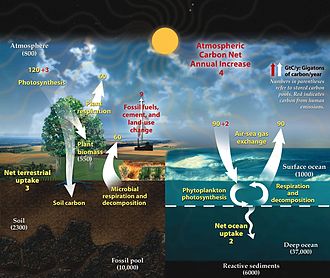Carbon cycle: Difference between revisions
Florez4747 (talk | contribs) (Created page with "thumb|Carbon cycle illustration "The carbon cycle is the biogeochemical cycle by which carbon is exchanged among the biosphere, pedosphere, geosphere, hydrosphere, and atmosphere of Earth. Carbon is the main component of biological compounds as well as a major component of many minerals such as limestone. Along with the nitrogen cycle and the water cycle, the carbon cycle comprises a sequence of events that are key to make Earth capable of sust...") |
Florez4747 (talk | contribs) No edit summary |
||
| Line 1: | Line 1: | ||
[[File:Carbon cycle.jpg|thumb|Carbon cycle illustration]] | [[File:Carbon cycle.jpg|thumb|Carbon cycle illustration]] | ||
The carbon cycle is the process of carbon moving between different [[Carbon Stocks]]. | |||
"The carbon cycle is the biogeochemical cycle by which carbon is exchanged among the biosphere, pedosphere, geosphere, hydrosphere, and atmosphere of Earth. Carbon is the main component of biological compounds as well as a major component of many minerals such as limestone. Along with the nitrogen cycle and the water cycle, the carbon cycle comprises a sequence of events that are key to make Earth capable of sustaining life. It describes the movement of carbon as it is recycled and reused throughout the biosphere, as well as long-term processes of carbon sequestration to and release from carbon sinks. Carbon sinks in the land and the ocean each currently take up about one-quarter of anthropogenic carbon emissions each year."<Ref>https://en.wikipedia.org/wiki/Carbon_cycle</Ref> | "The carbon cycle is the biogeochemical cycle by which carbon is exchanged among the biosphere, pedosphere, geosphere, hydrosphere, and atmosphere of Earth. Carbon is the main component of biological compounds as well as a major component of many minerals such as limestone. Along with the nitrogen cycle and the water cycle, the carbon cycle comprises a sequence of events that are key to make Earth capable of sustaining life. It describes the movement of carbon as it is recycled and reused throughout the biosphere, as well as long-term processes of carbon sequestration to and release from carbon sinks. Carbon sinks in the land and the ocean each currently take up about one-quarter of anthropogenic carbon emissions each year."<Ref>https://en.wikipedia.org/wiki/Carbon_cycle</Ref> | ||
Revision as of 03:37, 18 June 2023
The carbon cycle is the process of carbon moving between different Carbon Stocks.
"The carbon cycle is the biogeochemical cycle by which carbon is exchanged among the biosphere, pedosphere, geosphere, hydrosphere, and atmosphere of Earth. Carbon is the main component of biological compounds as well as a major component of many minerals such as limestone. Along with the nitrogen cycle and the water cycle, the carbon cycle comprises a sequence of events that are key to make Earth capable of sustaining life. It describes the movement of carbon as it is recycled and reused throughout the biosphere, as well as long-term processes of carbon sequestration to and release from carbon sinks. Carbon sinks in the land and the ocean each currently take up about one-quarter of anthropogenic carbon emissions each year."[1]
Terrestrial biological carbon cycle
"Living biomass holds about 550 gigatons of carbon,[1] most of which is made of terrestrial plants (wood), while some 1,200 gigatons of carbon are stored in the terrestrial biosphere as dead biomass.
Carbon is cycled through the terrestrial biosphere with varying speeds, depending on what form it is stored in and under which circumstances. It is exchanged most quickly with the atmosphere, although small amounts of carbon leave the terrestrial biosphere and enter the oceans as dissolved organic carbon (DOC)."[2]
